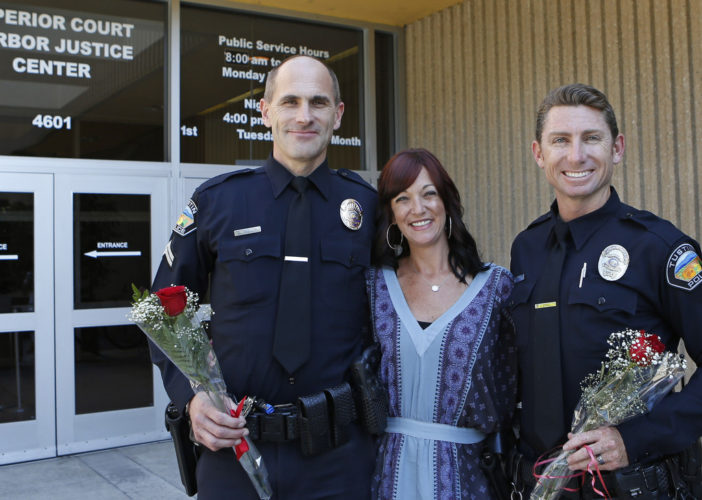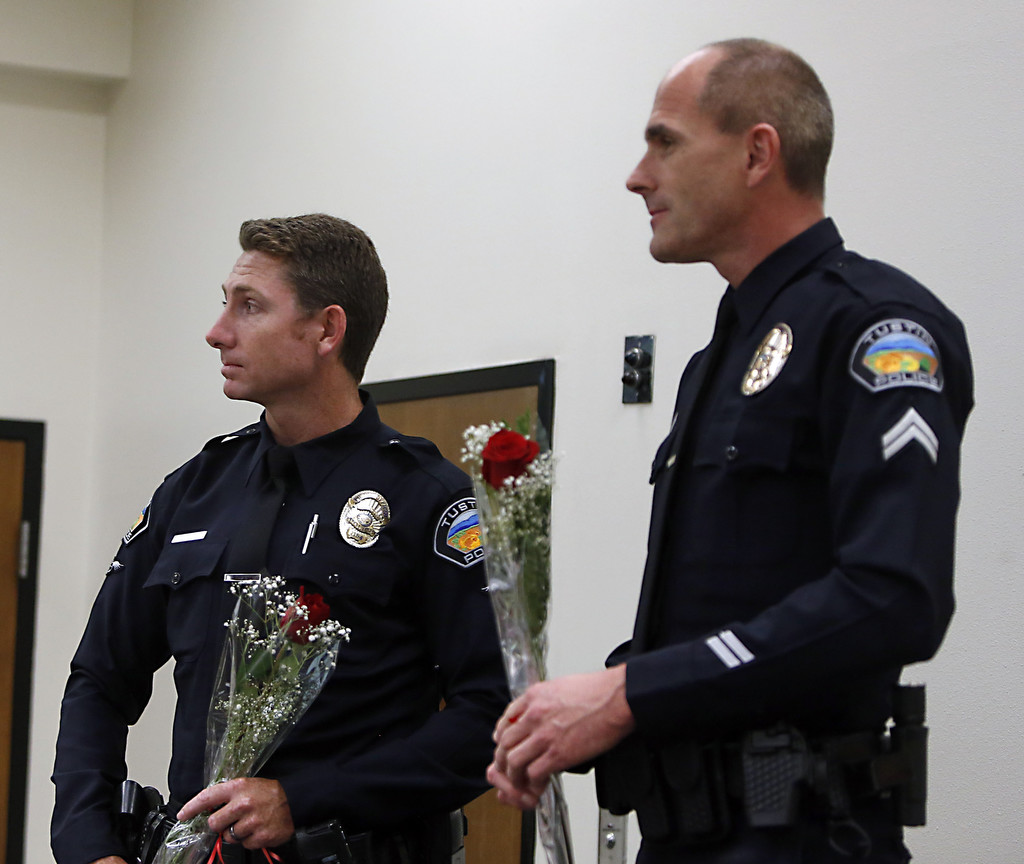In their combined 24 years with the department, the Tustin officers said they had never before seen this.
Typically, officers David Welde and John Hedges don’t make appearances in Drug Court, but on Monday, they were invited.
The woman they arrested two years ago on several felony and misdemeanor charges, including drunken driving and child endangerment, stood before the judge in the Harbor Justice Center.
Kelli Capone, 39, looked happy, healthy — not like when she first entered that courtroom nearly two years ago.
Welde and Hedges remembered her much differently.
The Capone they remember was a woman at her worst.
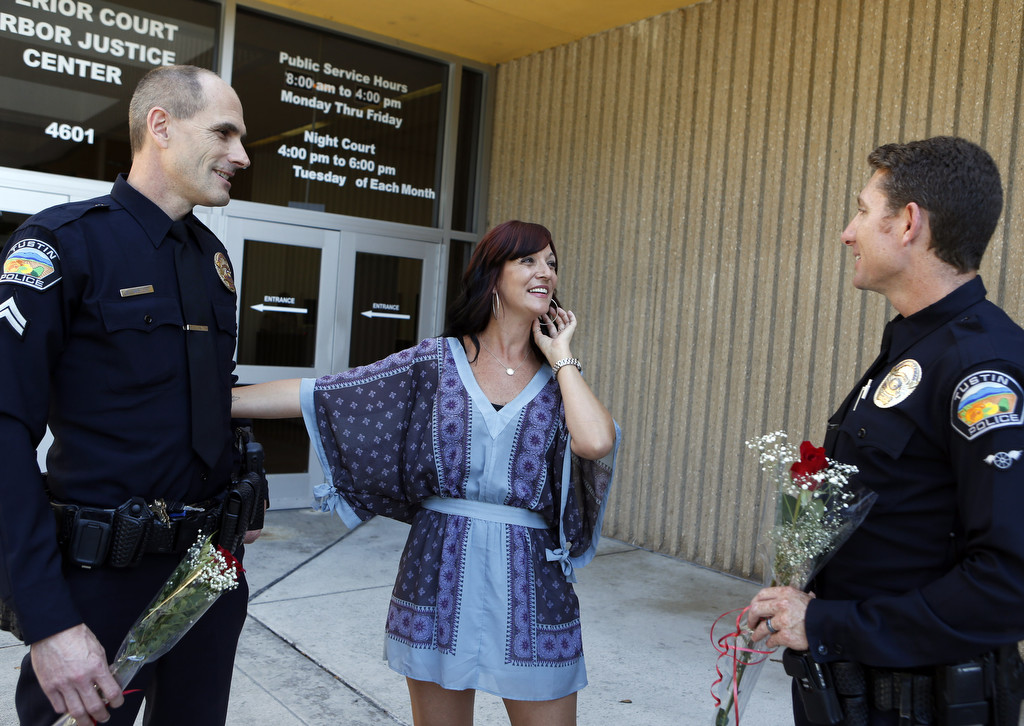
Kelli Capone expresses her gratitude to Tustin police officers David Welde and John Hedges, from left, after her graduation at Harbor Court from a rehab program.
Photo by Christine Cotter/Behind the Badge OC
…
More than a decade ago, Capone began experimenting with pain killers.
She was prescribed Vicodin after undergoing surgery, but started taking the pills even when she didn’t need them.
Capone soon became immune to the numbing effect of Vicodin, so she tried something stronger.
Friends introduced her to a local doctor who prescribed whatever type of of pain pills she wanted — Norco, Xanax, Klonopin, Oxycontin — he only required she pay cash.
Recreational use gave way to full-blown addiction and Capone said she found herself manipulating and stealing to feed her habit.
“I lied to everyone,” she said. “When my mom tried to help me, I would rage and scream, causing the police to visit her home on a weekly basis for months.”
On her more lucid days, Capone wanted out.
She tried rehab, but relapsed soon after her release, she said.
“I always wanted to get off pills,” she said. “I always wanted that life, but I didn’t know how to get it.”
Then on Aug. 11, 2012, Hedges responded to a call of a woman asleep at a gas pump at the Arco station on Newport Boulevard and Mitchell Avenue.
When he arrived, Capone couldn’t even stand, he said.
Her eldest daughter Emily, who was 11 at the time, was in the backseat of the car.
Capone said she had overdosed on pain killers.
“I was in really bad shape, they weren’t able to arrest me at the time,” Capone said. “They had to take me straight to the hospital.”
She was treated at the hospital and was arrested there, Hedges said.
He filed charges for being under the influence, but the case didn’t progress before Capone was again on Tustin PD’s radar.
On Oct. 27, 2012 a busted headlight prompted Welde to pull Capone over on Main Street near Centennial Way, just about a block from the PD.
When he saw Capone, he knew that she was under the influence.
“I couldn’t even conduct a (field sobriety test) because she was so bad,” he said. “I had to help her out of the car and support her from the driver’s seat to the curb.”
Capone said she remembered Welde finding her pain killers in the car.
“I had a lot of pills on me but I avoided drug charges because I had a prescription for everything,” she said.
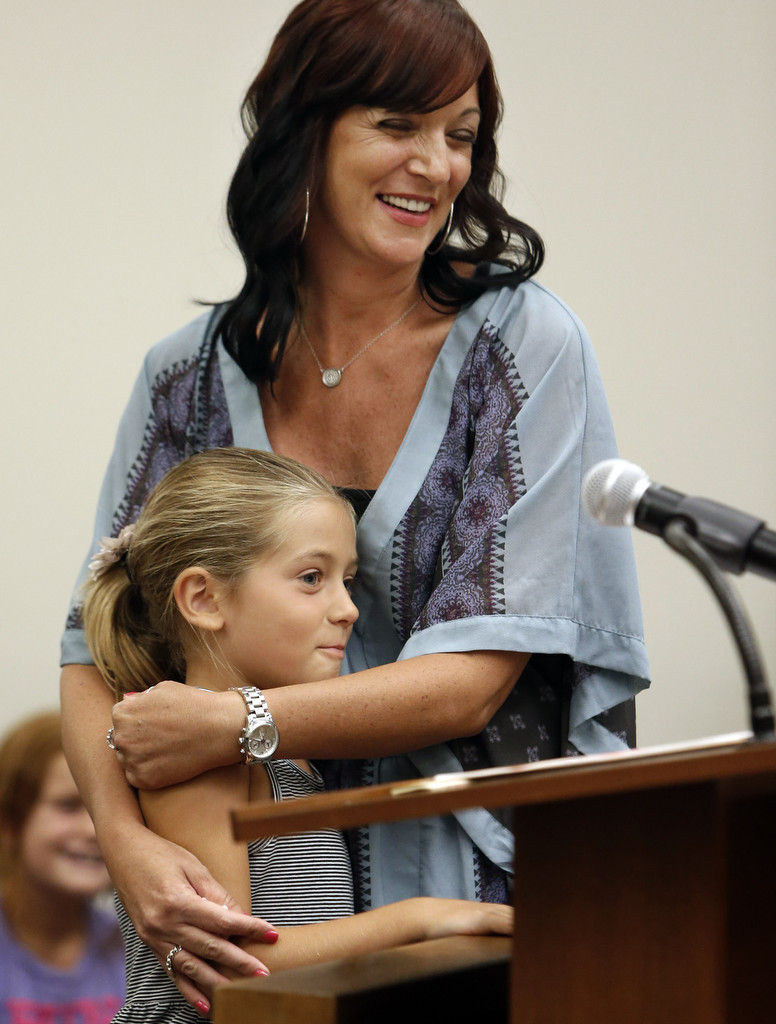
Kelli Capone hugs her daughter Rachel in Harbor Superior Court during her graduation from rehab. Tustin police officers David Welde and John Hedges were instrumental in getting her in the program.
Photo by Christine Cotter/Behind the Badge OC
This time her younger daughter, Rachel, who was 6 at the time, was in the backseat.
Welde helped the scared and confused little girl out of the car and called for help from social services.
The 6-year-old was taken to Orangewood Children’s Home, where she was later picked up by her grandmother.
“I am very grateful that my mom was able to take care of my daughters,” Capone said. “Once I knew they were OK, I was ready to do what I needed to.”
As Capone sat in a Tustin holding cell, slowly emerging from an opioid-induced fog, her emotions swirled.
Fear was the most prevalent, but deep down Capone said she felt something she hadn’t experienced in years.
“I was relieved when I got arrested,” she said. “I needed to hit a bottom. I needed to get arrested. I needed to go to jail. I needed to get better.”
…
Capone was convicted of several misdemeanors, including driving under the influence, and felony child endangerment.
She spent 32 days in jail.
Her mother, Rosanne, wouldn’t bail her out and wouldn’t take her calls. She wanted her daughter to get better and was comforted by the fact that behind bars, she was safe.
“I thank the officers with all my heart,” she said. “The night she got arrested was the first time I slept in three years, not worrying about my daughter being dead.”
Capone’s daughters visited her in jail, but they cried when they saw their mom sitting behind plexiglass.
Capone on Nov. 29, 2012 pleaded in to the Orange County Superior Court DUI Court Program at the Harbor Justice Center — an intensive 18-month program that forces those in recovery to be accountable as they move through their treatment.
Participants must participate in group and individual therapy sessions, hold a job, adhere to parole and curfew checks and even enroll in college courses, among other program requirements.
Capone’s path took a little longer than the traditional 18 months as she navigated through family court proceedings to regain custody of her daughters, completed required classes for her drunken driving arrest and attended parenting classes.
She also held down a job at Roger’s Gardens, where she works as an administrative assistant and also helps on the sales floor.
Capone stayed the course and in June reached out to the officers she said were the first step in her recovery journey.
She said she remembers the way the officers spoke to her when she was at her darkest.
“They didn’t put me down,” she said. “They arrested me with a lot of encouragement that I was better, I could do better.
“I got arrested and it was the best thing that ever happened to me.”
Capone said it was important that she thank them and show the progress she made.
“It started with (them) and for that, I am so grateful,” she said.
…
When Welde and Hedges entered the Harbor Justice Center that Monday, July 20, the Orange County Sheriff Deputy manning the security check asked the casual question: “Where you headed?”
“H4,” the officers told the deputy, an answer that solicited a puzzled look.
That room is reserved for what is informally known as “Drug Court” – not something police officers are required to attend.
But Welde and Hedges were invited, and they wanted to be there.
“In my 11 years, I’ve never been invited to anything like this,” Hedges said. “In your career, you make so many arrests and rarely ever learn what happens to those people.”
Added Welde: “It is nice to see something positive come out of this.”
The officers sat in the jury box and Jude Matthew Anderson, who presides over the Harbor Drug Court program, took notice.
“You get to see people at their absolute worst,” Anderson told them. “Now you can see the end and the continuation of that story in Ms. Capone’s life.”

Harbor Superior Court Judge Matthew S. Anderson takes in the moment as Kelli Capone completes graduation from a rehab program in Harbor Court. Tustin Police officers David Welde and John Hedges were instrumental in getting her enrolled.
Photo by Christine Cotter/Behind the Badge OC
Capone talked about her life now.
She has full custody of her daughters, is close with her mother and continues to work at Roger’s Gardens — a job she loves.
After finishing the courses at Irvine Valley College required by the court program, Capone continued taking classes.
Now, she plans to finish college.
Capone wants to major in psychology and become a drug counselor to help others who battle the same demons she did.
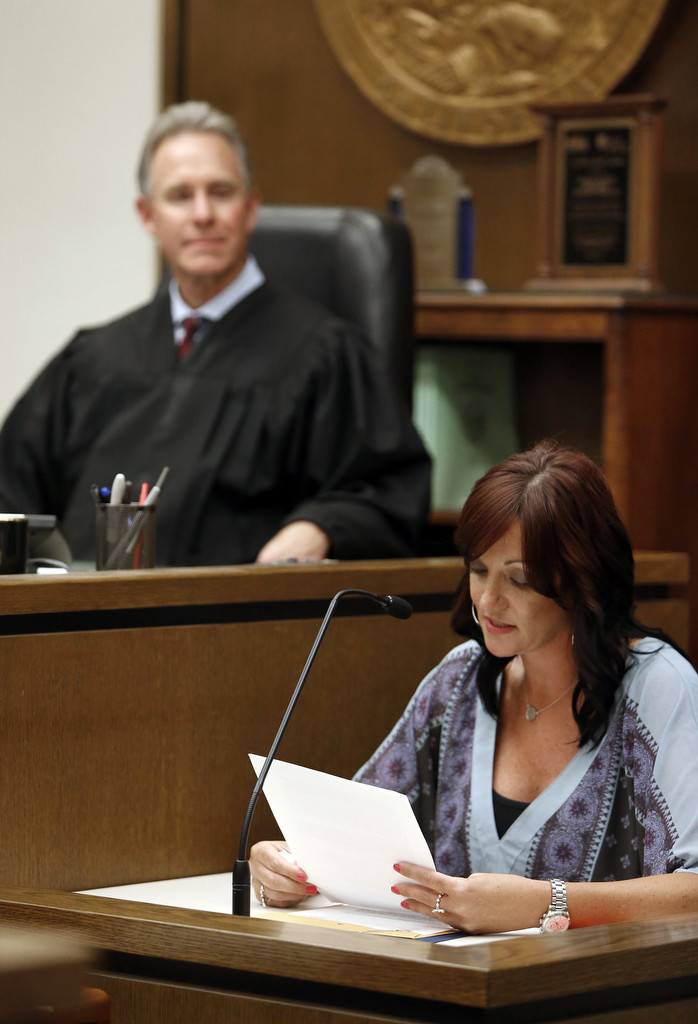
Kelli Capone completes her graduation from a rehab program as Harbor Superior Court Judge Matthew S. Anderson presides. Tustin police officers David Welde and John Hedges were instrumental in getting her into the program.
Photo by Christine Cotter/Behind the Badge OC
Family and friends also talked about Capone’s recovery and congratulated her.
They all shared similar sentiments as they spoke of her warm personality and selfless nature. The term “big-hearted” was used several times to describe Capone.
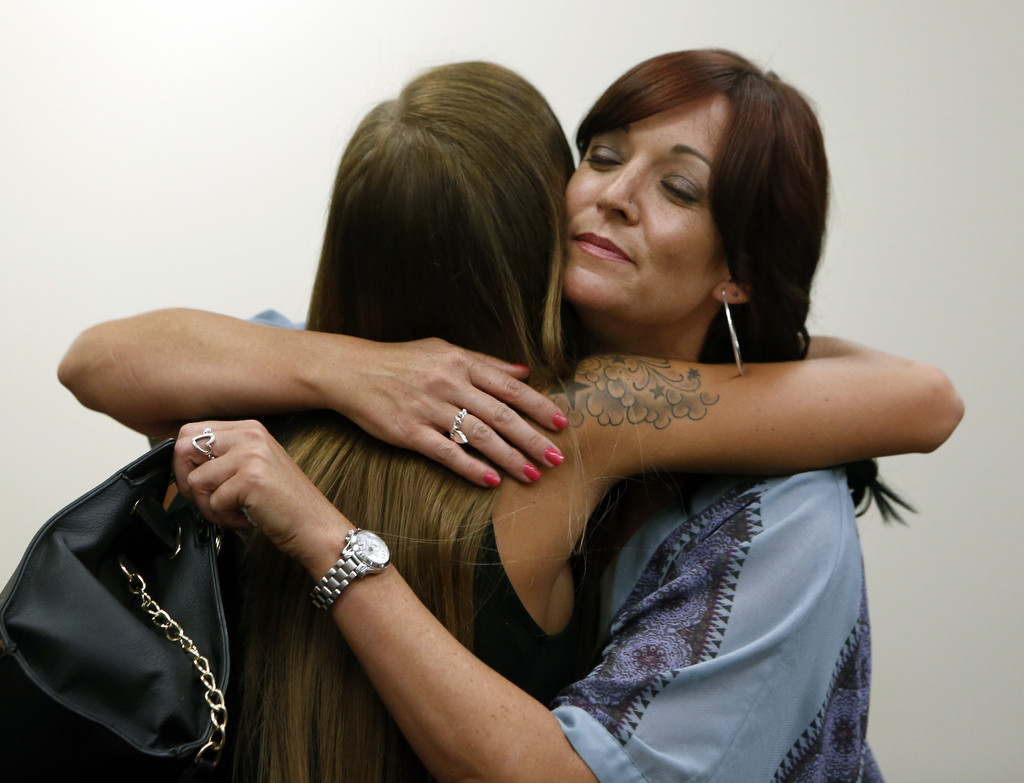
Kelli Capone gets a hug from a supporter during her graduation from a drug and alcohol rehab program. Tustin police officers David Welde and John Hedges were instrumental in getting her in the program.
Photo by Christine Cotter/Behind the Badge OC
Capone gave a speech detailing her journey and thanked those who helped her along the way.
As is tradition in the program, graduates are given a single red rose they can give to someone who played an integral role on their road to recovery.
Capone presented her rose and an extra one she brought with her to Welde and Hedges.
“Officer Welde and Officer Hedges, you are my heroes,” she told them. “Thank you for not only saving my daughters’ lives, but many that were on the road while I was driving under the influence of prescription pills.
“You not only saved my life, you showed me the way to a happy and healthy life, which I never knew was possible.”
 Behind the Badge
Behind the Badge
